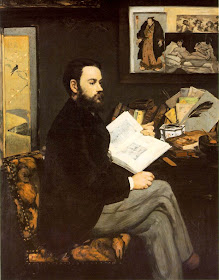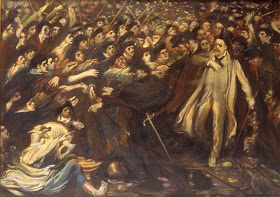
I have come to a kind of crisis in my traversal of Emile Zola’s 20-volume series of novels, the Rougon-Macquart cycle, “the natural history of a family under the Second Empire.” Most of the books concern truly awful people, and Zola excels at depicting sordid behavior and outrageous events: I have reveled in the pages of L’Assommoir, Nana, Pot-Bouille, Germinal, La Terre, and La Bête Humaine. In the penultimate volume of the series, La Débâcle, the niceness of the characters is secondary to the Franco-Prussian War; the author’s fury at incompetent generals and at the ineffectual Emperor, Napoléon III, enlivens many passages, and the numerous scenes of combat are as grisly and wince-inducing as battlefield photographs might be.
Now I’ve gotten to the cycle’s final volume, Le Docteur Pascal, and my distress mounts by the paragraph. I’m 100 pages in already, and not once has a single character cheated his aunties, passed out drunk, committed theft, arson, or adultery, staged a train wreck, or raped an old lady. What the hell?
A very few of the Rougon-Macquart books are concerned with basically nice, fundamentally sane characters, but they’re tough slogging for this reader. La Faute de l’Abbé Mouret is about an earnest young priest who falls in love with a free-spirited girl, presumably shocking stuff in 19th-century France. But no fear — Abbet Mouret wouldn’t really break his priestly vows — his maxima culpa is only the result of a head injury! I’ve seen soap opera plots more daring. (I preferred a preceding volume, La Conquête de Plassans, in which another priest schemes his way to political prominence, while one local matron —Abbé Mouret’s mother, as it happens — develops a violently erotic crush on him.)
I’ve written in this space about my dissatisfaction with the opening pages of Le Rêve, in which an angelic blonde orphan, stranded in the snow, is taken in by a kindly couple — I had to set that one aside for some other time. I managed to stay the course with Une Page d’amour, mainly because the heroine’s daughter turns out to be a deliciously manipulative hysteric. Threatened by the attraction between her mother and a handsome, wealthy neighbor, little Jeanne throws fits and succumbs to sudden fevers. She’ll stop at nothing to thwart her mother’s happiness. A truly dedicated little hypochondriac, she takes to her bed for months at a stretch — then dies.
The Rougons (mostly ruthless predators, but prone to mental instability) and the Macquarts (mostly drunks and dreamers) behave as they do, Zola insists, because of particular genetic traits. In Le Docteur Pascal, the author attempts to assemble and to validate his theories of heredity; we see at last just how serious he was when he called this “A Natural History.” Helpfully, Zola lays out a family tree, in which characters are identified by moral and physical “élections”; that is, they take after the mother or the father, or a mixture of both, or some other ancestor. (A very few characters, including Dr. Pascal Rougon himself, take after neither side of the family, a natural phenomenon Zola acknowledges but can’t explain.)
Anybody with a seventh-grade education in biology (which is about all I’ve got) knows that Zola’s theories don’t hold up, despite the way the author keeps stacking the deck in his own favor. All the while he wrote, the new field of psychology already was blowing gaping holes in his science, even as it corroborated his characterizations and plots. The books all remain perfectly plausible — Zola was too keen an observer, too relentless a researcher to write piffle — but sex, and not genetics, emerges as the great motivator in these tales.
We come to Zola, as I say, for his unblinking eye, for his abilities to capture every detail in any segment of French society, to root out the very worst of human nature and still to entertain us. We don’t come to him for moral lessons, and we don’t come to him for uplift. Everyone in Le Docteur Pascal has behaved himself impeccably thus far — but I’m not yet ready to set the book aside. There’s much to be said for coming to the end of this saga, which has occupied me, on and off, for some six years.
And besides, if you look closely at the Rougon-Macquart family tree, you’ll see that Dr. Pascal has a child, late in life — by his own niece. She’s his ward, by the way, and she’s also the daughter of the lovably odious Aristide Saccard (of La Curée and L’Argent). Somewhere in this book, there’s a story. I’m determined to find it.
Now I’ve gotten to the cycle’s final volume, Le Docteur Pascal, and my distress mounts by the paragraph. I’m 100 pages in already, and not once has a single character cheated his aunties, passed out drunk, committed theft, arson, or adultery, staged a train wreck, or raped an old lady. What the hell?
A very few of the Rougon-Macquart books are concerned with basically nice, fundamentally sane characters, but they’re tough slogging for this reader. La Faute de l’Abbé Mouret is about an earnest young priest who falls in love with a free-spirited girl, presumably shocking stuff in 19th-century France. But no fear — Abbet Mouret wouldn’t really break his priestly vows — his maxima culpa is only the result of a head injury! I’ve seen soap opera plots more daring. (I preferred a preceding volume, La Conquête de Plassans, in which another priest schemes his way to political prominence, while one local matron —Abbé Mouret’s mother, as it happens — develops a violently erotic crush on him.)
I’ve written in this space about my dissatisfaction with the opening pages of Le Rêve, in which an angelic blonde orphan, stranded in the snow, is taken in by a kindly couple — I had to set that one aside for some other time. I managed to stay the course with Une Page d’amour, mainly because the heroine’s daughter turns out to be a deliciously manipulative hysteric. Threatened by the attraction between her mother and a handsome, wealthy neighbor, little Jeanne throws fits and succumbs to sudden fevers. She’ll stop at nothing to thwart her mother’s happiness. A truly dedicated little hypochondriac, she takes to her bed for months at a stretch — then dies.
The Rougons (mostly ruthless predators, but prone to mental instability) and the Macquarts (mostly drunks and dreamers) behave as they do, Zola insists, because of particular genetic traits. In Le Docteur Pascal, the author attempts to assemble and to validate his theories of heredity; we see at last just how serious he was when he called this “A Natural History.” Helpfully, Zola lays out a family tree, in which characters are identified by moral and physical “élections”; that is, they take after the mother or the father, or a mixture of both, or some other ancestor. (A very few characters, including Dr. Pascal Rougon himself, take after neither side of the family, a natural phenomenon Zola acknowledges but can’t explain.)
Anybody with a seventh-grade education in biology (which is about all I’ve got) knows that Zola’s theories don’t hold up, despite the way the author keeps stacking the deck in his own favor. All the while he wrote, the new field of psychology already was blowing gaping holes in his science, even as it corroborated his characterizations and plots. The books all remain perfectly plausible — Zola was too keen an observer, too relentless a researcher to write piffle — but sex, and not genetics, emerges as the great motivator in these tales.
We come to Zola, as I say, for his unblinking eye, for his abilities to capture every detail in any segment of French society, to root out the very worst of human nature and still to entertain us. We don’t come to him for moral lessons, and we don’t come to him for uplift. Everyone in Le Docteur Pascal has behaved himself impeccably thus far — but I’m not yet ready to set the book aside. There’s much to be said for coming to the end of this saga, which has occupied me, on and off, for some six years.
And besides, if you look closely at the Rougon-Macquart family tree, you’ll see that Dr. Pascal has a child, late in life — by his own niece. She’s his ward, by the way, and she’s also the daughter of the lovably odious Aristide Saccard (of La Curée and L’Argent). Somewhere in this book, there’s a story. I’m determined to find it.


No comments:
Post a Comment